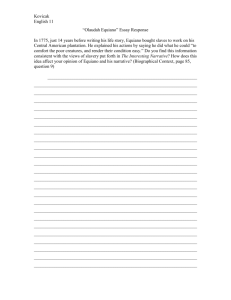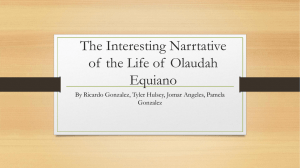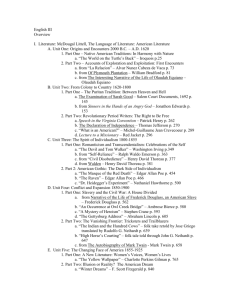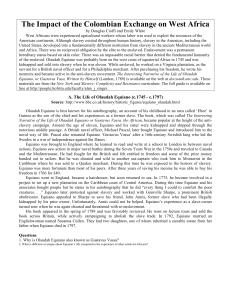Activity 4. Olaudah Equiano Remembers Life in West Africa Source: Background:
advertisement
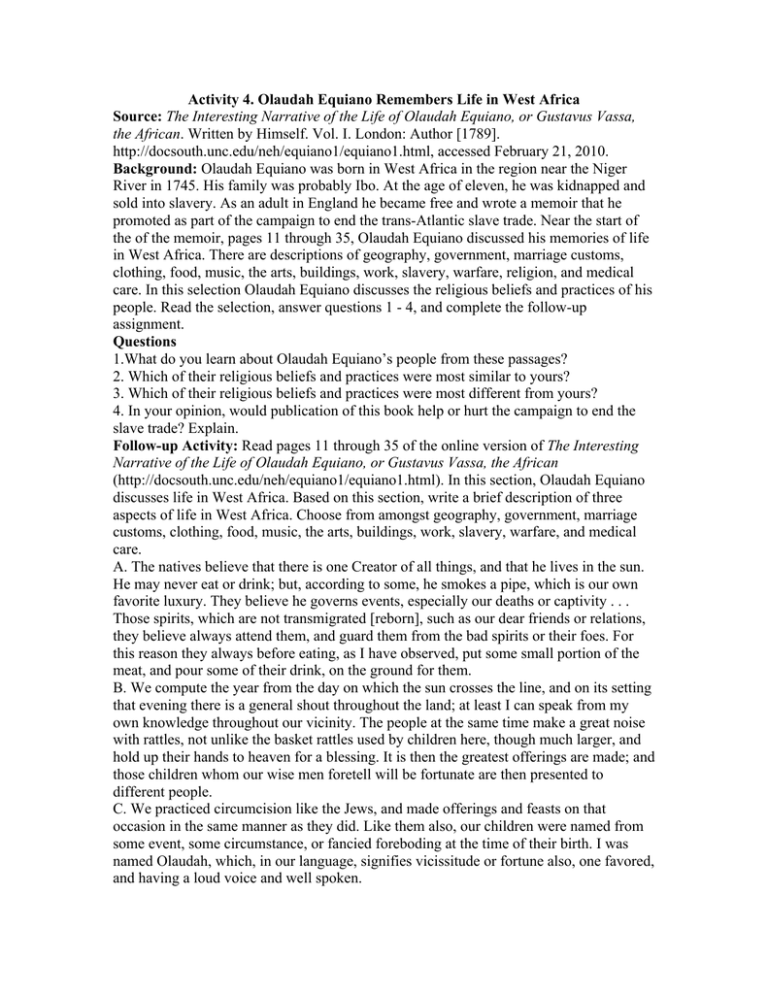
Activity 4. Olaudah Equiano Remembers Life in West Africa Source: The Interesting Narrative of the Life of Olaudah Equiano, or Gustavus Vassa, the African. Written by Himself. Vol. I. London: Author [1789]. http://docsouth.unc.edu/neh/equiano1/equiano1.html, accessed February 21, 2010. Background: Olaudah Equiano was born in West Africa in the region near the Niger River in 1745. His family was probably Ibo. At the age of eleven, he was kidnapped and sold into slavery. As an adult in England he became free and wrote a memoir that he promoted as part of the campaign to end the trans-Atlantic slave trade. Near the start of the of the memoir, pages 11 through 35, Olaudah Equiano discussed his memories of life in West Africa. There are descriptions of geography, government, marriage customs, clothing, food, music, the arts, buildings, work, slavery, warfare, religion, and medical care. In this selection Olaudah Equiano discusses the religious beliefs and practices of his people. Read the selection, answer questions 1 - 4, and complete the follow-up assignment. Questions 1.What do you learn about Olaudah Equiano’s people from these passages? 2. Which of their religious beliefs and practices were most similar to yours? 3. Which of their religious beliefs and practices were most different from yours? 4. In your opinion, would publication of this book help or hurt the campaign to end the slave trade? Explain. Follow-up Activity: Read pages 11 through 35 of the online version of The Interesting Narrative of the Life of Olaudah Equiano, or Gustavus Vassa, the African (http://docsouth.unc.edu/neh/equiano1/equiano1.html). In this section, Olaudah Equiano discusses life in West Africa. Based on this section, write a brief description of three aspects of life in West Africa. Choose from amongst geography, government, marriage customs, clothing, food, music, the arts, buildings, work, slavery, warfare, and medical care. A. The natives believe that there is one Creator of all things, and that he lives in the sun. He may never eat or drink; but, according to some, he smokes a pipe, which is our own favorite luxury. They believe he governs events, especially our deaths or captivity . . . Those spirits, which are not transmigrated [reborn], such as our dear friends or relations, they believe always attend them, and guard them from the bad spirits or their foes. For this reason they always before eating, as I have observed, put some small portion of the meat, and pour some of their drink, on the ground for them. B. We compute the year from the day on which the sun crosses the line, and on its setting that evening there is a general shout throughout the land; at least I can speak from my own knowledge throughout our vicinity. The people at the same time make a great noise with rattles, not unlike the basket rattles used by children here, though much larger, and hold up their hands to heaven for a blessing. It is then the greatest offerings are made; and those children whom our wise men foretell will be fortunate are then presented to different people. C. We practiced circumcision like the Jews, and made offerings and feasts on that occasion in the same manner as they did. Like them also, our children were named from some event, some circumstance, or fancied foreboding at the time of their birth. I was named Olaudah, which, in our language, signifies vicissitude or fortune also, one favored, and having a loud voice and well spoken. D. Though we had no places of public worship, we had priests and magicians, or wise men. I do not remember whether they had different offices, or whether they were united in the same persons, but they were held in great reverence by the people . . . They wore their beards, and when they died they were succeeded by their sons. Most of their implements and things of value were interred along with them. Pipes and tobacco were also put into the grave with the corpse, which was always perfumed and ornamented, and animals were offered in sacrifice to them. None accompanied their funerals but those of the same profession or tribe. These buried them after sunset, and always returned from the grave by a different way from that which they went.

